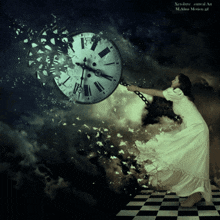My Own Version of You
Looking for the necessary body parts
Limbs and livers and brains and hearts
I want to bring someone to life - is what I want to do
I want to create my own version of you
It must be the winter of my discontent
I wish you’d taken me with you wherever you went
They talk all night - they talk all day
Not for a second do I believe what they say
I want to bring someone to life - someone I’ve never seen
You know what I mean - you know exactly what I mean
I’ll take the Scarface Pacino and the Godfather Brando
Mix ‘em up in a tank and get a robot commando
If I do it up right and put the head on straight
I’ll be saved by the creature that I create
I get blood from a cactus - gunpowder from ice
I don’t gamble with cards and I don’t shoot no dice
Can you look in my face with your sightless eye
Can you cross your heart and hope to die
I’ll bring someone to life - someone for real
Someone who feels the way that I feel
I study Sanskrit and Arabic to improve my mind
I want to do things for the benefit of all mankind
I say to the willow tree - don’t weep for me
I’m saying the hell with all things that used to be
No place to turn - no place at all
I pick a number between one and two
And I ask myself what would Julius Caesar do
I’ll bring someone to life - in more ways than one
Don’t matter how long it takes - it’ll be done when it’s done
I’m gonna make you play the piano like Leon Russell
Like Liberace - like St. John the Apostle
Play every number that I can play
I’ll see you baby on Judgement Day
After midnight if you still want to meet
I’ll be at the Black Horse Tavern on Armageddon Street
Two doors down, not that far to walk
I’ll hear your footsteps - you won’t have to knock
I’ll bring someone to life - balance the scales
I’m not gonna get involved in any insignificant details
You can bring it to St. Peter - you can bring it to Jerome
You can move it on over - bring it all the way home
Bring it to the corner where the children play
You can bring it to me on a silver tray
I’ll bring someone to life - spare no expense
Do it with decency and common sense
Can you tell me what it means to be or not to be
You won’t get away with fooling me
Can you help me walk that moonlight mile
Can you give me the blessings of your smile
I want to bring someone to life - use all my powers
Do it in the dark in the wee small hours
I can see the history of the whole human race
It’s all right there - its carved into your face
Should I break it all down - should I fall on my knees
Is there light at the end of the tunnel - can you tell me please
Stand over there by the Cypress tree
Where the Trojan women and children were sold into slavery
Long ago before the First Crusade
Way back before England or America were made
Where some of the best known enemies of mankind dwell
Mister Freud with his dreams and Mister Marx with his axe
See the rawhide lash rip the skin off their backs
You got the right spirit - you can feel it you can hear it
You got what they call the immortal spirit
You can feel it all night you can feel it in the morn
Creeps into your body the day you are born
One strike of lightning is all that I need
And a blast of ‘lectricity that runs at top speed
Show me your ribs - I’ll stick in the knife
I’m gonna jump start my creation to life
I want to bring someone to life - turn back the years
Do it with laughter - do it with tears









































